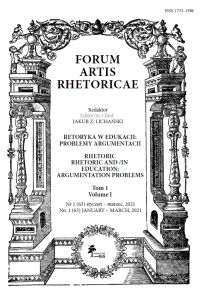Obecny tom FORUM ARTIS RHETORICAE kontynuuje problematykę związaną z
zastosowaniem retoryki w edukacji. Głównym jednak przedmiotem naszego zainteresowania
jest zagadnienie argumentacji.
Jesteśmy bardzo wdzięczni profesorowi Richardowi Andrewsowi oraz redakcji „Utbildning
& Demokrati”, pisma wydawanego na Uniwersytetcie w Örebro (Szwecja)1,
za zgodę na publikację tłumaczenia bardzo interesującego oraz ważnego tekstu, jakim
jest artykuł Profesora: Th e importance of Rhetoric and argumentation to schools
in England (Znaczenie retoryki i argumentacji w szkolnictwie angielskim)2. Artykuł
ten ukazał się w piśmie „Utbildning & Demokrati” 2019, vol 28, no 2, 77–92. Jak
pisze Profesor:
Retoryka wypadła z łask w edukacji w Anglii w XX wieku, głównie w wyniku
podziału między językiem angielskim a Literatura angielska końca XIX wieku.
Wraz ze wzrostem Literatury jako centralnego przedmiotu cywilizacyjnego
w programie nauczania w Anglii w latach dwudziestych XX wieku retoryka
zmniejszyła się i zaczęła odnosić się do stylistyki literackiej lub do
skorumpowanego dyskursu politycznego. W niniejszym artykule podjęto
próbę przywrócenia retoryki do programu nauczania jako nadrzędnej i
integrującej teorii komunikacji. Nie tylko przenosi argumentację z powrotem
do szeregu metagatunków, które są ważne w dyskursie mówionym i pisanym,
ale także przemawia za podejściem multimodalnym. Omówiono takie
zagadnienia jak: tekst (i jego tworzenie), kompozycję, układ i dialog, a także
ich pedagogiczne zastosowania.
W konkluzji artykułu wskazuje, jak mógłby wyglądać program nauczania który
zawiera retorykę jako kluczowy element i jak to posunięcie może wzmocnić
demokratyczny charakter szkoły, jak również możliwości intelektualne jej
uczniów.
Artykuł ten otrzymał „wsparcie” trzech tekstów praktycznych, z których jeden,
acz jest tylko omówieniem książki profesora Masona Marshalla Reading Plato’s
Dialogues to Enhance Learning and Inquiry: Exploring Socrates’ Use of Protreptic
for Student Engagement (New York: Routledge, 2021), to autor omówienia stara się
przedstawić najważniejsze tezy tej szalenie interesującej publikacji. Wydawca zwraca
uwagę, iż książka ta:
Poprzez analizę dialogów platońskich, w tym Kriton, Eutyfron, Menon i Państwo, tekst podkreśla
sposoby promowania i zachęcania używane przez Sokratesa do samooceny i świadomej
refl eksji u współrozmówcy. Koncentrując się w swojej pracy na używaniu protreptyki przez
Sokratesa, Marshall proponuje praktyczne podejście do czytania Platona, ilustrując, w jaki
sposób jego pisma mogą być wykorzystane do zwiększenia wewnętrznej motywacji uczniów
i pomóc im rozwinąć umiejętności myślenia wymagane do demokratycznego i obywatelskiego
zaangażowania. Ten wciągający tom zainteresuje doktorantów, badaczy i naukowców
zajmujących się dialogami Platona, fi lozofi ą edukacji i szerzej fi lozofi ą starożytną, a także studentom
podyplomowym zainteresowanym badaniami nad edukacją moralną i wartościami.
Drugim, niezwykle ważkim, jest tekst Krzysztofa Obremskiego, Alternatywna
konkretyzacja arystotelesowskiej ogólnej charakterystyki trzech rodzajów wymowy
(Alternative Substantiation of the Aristotle’s General Characteristics of the Th ree
Kinds of Rhetorical Genre), który pokazuje pułapki, jakie pojawiają się, gdy tłumaczymy
na język polski greckie pojęcia. Co więcej: gdy wyjaśniamy ich zakresy znaczeniowe
mogą pojawić się nieporozumienia prowadzące do – nieświadomego – ale
wypaczenia myśli Stagiryty.
Także analiza argumentacji, jaka była stosowana m.in. w informacjach związanych
z pandemią koronawirusa, pokazuje jak łatwo dobra i rzetelna (oraz potrzebna
informacja) staje się swoją odwrotnością na skutek stosowania błędnej argumentacji,
Autor zwraca uwagę, iż:
Rozważania, jakie dalej przedstawię, mogą nam pomóc w zrozumieniu w jaki sposób demagodzy
manipulują opinią publiczną. Jak się okaże techniki są dobrze opisane już w czasach
antyku i w zasadzie niewiele się zmieniły od tamtych czasów. Poznanie tych technik może
nam pozwolić znaleźć obronę przeciw tym zabiegom; co więcej – demaskować takie zabiegi.
Jako przykład sięgnę po przykłady z wypowiedzi medialnych dotyczących epidemii koronawirusa
SARS CoV 19.
Powinniśmy pamiętać bowiem, iż i wykorzystując te techniki, i poddając się im
wpadamy w pułapkę, jaką zastawił na nas Hermes. Tymczasem winniśmy postępować
za wskazaniami Ateny, aby nie narazić się na gniew bogów.
Redakcja wyraża nadzieję, iż teksty te pomogą w ukształtowaniu nowego postrzegania
i samej retoryki, i przede wszystkim argumentacji jako dobrych narzędzi
w procesie kształcenia. Zarazem – jak unikać w procesach komunikacji wszelkich
działań, które zamiast przekazywać prawdę wpadają, często nieświadomie, w pułapkę
fake newsów. Także – w pokazaniu, jak ważna dziś jest edukacja obejmująca
także edukację moralną i problemy wartości.
Kind Reader!
Th e present volume of FORUM ARTIS RHETORICAE continues the problems related
to the use of rhetoric in education. However, the main subject of our interest
is the issue of argumentation.
We are very grateful to Professor Richard Andrews and the editorial offi ce of
“Utbildning & Demokrati”, a journal issued at the University of Örebro (Sweden)3,
for agreeing to publish a translation of an extremely interesting and important text,
which is the Professor’s article: Th e importance of Rhetoric and argumentation to
schools in England4. Th is article was published in the journal “Utbildning & Demokrati”
2019, vol 28, no 2, 77–92. As the Professor writes:
Rhetoric fell out of favour in education in England in the twentieth century, largely as a result
of the split between English Language and English Literature in the late nineteenth century.
With the ascendance of Literature as the central civilizing subject of the school curriculum
in England by the 1920s, rhetoric diminished in scope and came to refer to literary
stylistics or to corrupt political discourse. Th e present article seeks to restore rhetoric to the
curriculum as an overarching and integrat ing theory for communication. It not only brings
argumentation back into the range of meta-genres that are important in spoken and written
discourse, but also argues for a multimodal approach. Text, composition, framing and dialogue
are discussed, as well as their pedagogical applica tions. Th e end of the article addresses
what a curriculum might look like that has rhetoric as a key element, and how this move
might enhance the democratic nature of the school as well as the capabilities of its students.
Th is article was “supported” by two practical texts, one of which, although it
is only a review of Professor Mason Marshall’s book Reading Plato’s Dialogues to
Enhance Learning and Inquiry: Exploring Socrates’ Use of Protreptic for Student
Engagement (New York: Routledge, 2021), is the author of the discussion tries to
present the most important theses of this extremely interesting publication. Th e
publisher points out that this book:
This scholarly volume proposes protreptic as a radically new way of reading
Plato’s dialogues leading to enhanced student engagement in learning and
inquiry.
Through analysis of Platonic dialogues including Crito, Euthyphro, Meno,
and Republic, the text highlights Socrates’ ways of fostering and encouraging
self-examination and conscionable relection. By focusing his work on
Socrates’ use of protreptic, Marshall proposes a practical approach to
reading Plato, illustrating how his writings can be used to enhance intrinsic
motivation amongst students, and help them develop the thinking skills
required for democratic and civic engagement.
This engaging volume will be of interest to doctoral students, researchers,
and scholars concerned with Plato’s dialogues, the philosophy of education,
and ancient philosophy more broadly, as well as post-graduate students
interested in moral and values education research.
Th e second, extremely important, is the text by Krzysztof Obremski, Alternative
Substantiation of the Aristotle’s General Characteristics of the Th ree Kinds of Rhetorical
Genre (Alternatywna konkretyzacja arystotelesowskiej ogólnej charakterystyki
trzech rodzajów wymowy), which shows the pitfalls that arise when we translate
Greek terms into Polish. Moreover, when we explain their meaning ranges, misunderstandings
may arise, leading to the – unconscious – but distortion of the Stagirite’s
thoughts.
Also the analysis of arguments that were used, among others in the information
related to the coronavirus pandemic, it shows how easily good and reliable (and
the necessary information) becomes its opposite as a result of the use of incorrect
argumentation, the author notes that:
Th e following considerations can help us understand how demagogues manipulate
public opinion. As it turns out, the techniques are well described in antiquity
and basically they haven’t changed much since then. Understanding these techniques
can help us fi nd a defense against these eff orts; moreover – expose such treatments.
As an example, I will refer to examples from media statements about the
SARS CoV 19 coronavirus epidemic.
We should remember that by using these techniques and surrendering to them, we fall into
the trap that Hermes has set for us. In the meantime, we should follow Athena’s instructions
so as not to expose ourselves to the wrath of the gods.
Th e editors hope that these texts will help to shape a new perception and rhetoric itself, and
above all, argumentation as good tools in the educational process. At the same time – how
to avoid any actions in communication processes which, instead of conveying the truth, fall,
oft en unconsciously, into the trap of fake news. Also – in showing how important today is
education that also includes moral education and problems of values.
Warszawa, 2021-03-03
Jakub Z. Lichański
Editor-in-Chief FORUM ARTIS RHETORICAE
ORCID: 0000-0002-1943-5069



 59 (4)
59 (4)
